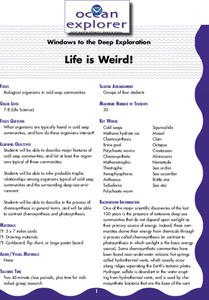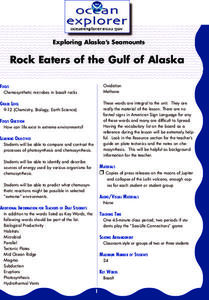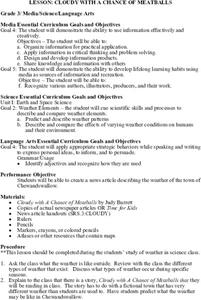Curated OER
Life is Weird!
Students describe major features of cold seep communities, and list at least five organisms typical of these communities. They infer probable trophic relationships among organisms typical of cold-seep communities and the surrounding...
Curated OER
Researching Famous People
Student take notes, on a graphic organizer, about the life of a famous person. They create a trading card about their famous person including a portrait and important facts.
Curated OER
Rock Eaters of the Gulf of Alaska
Students compare and contrast the processes of photosynthesis and chemosynthesis. They identify and describe sources of energy used by various organisms for chemosynthesis.
Curated OER
Jelly Critters
Students compare and contrast three different organisms that are considered gelatinous zooplankton. They describe how they fit into marine food webs.
Curated OER
2005 Hidden Ocean Expedition What's Eating You?
Analyze data and make inferences about the trophic position of organisms in the Canada marine food web. After a review of the geography and formula, discuss results and write an essay to improve the understanding of Artic food webs.
Curated OER
Getting to the Bottom
Students identify taxa in Arctic benthic communities. They discover organisms that live in these Arctic areas. They analyze data compiled for the Canada Basin Benthic Samples, 2002.
Curated OER
"Body Decorating and the Risks"
Learners read and outline a piece of expository writing to study the risks associated with tattoos and body piercing. They brainstorm low risk, healthful ways of expressing their identity as teens.
Curated OER
Cloudy With a Chance of Meatballs
Third graders discuss the weather and how it changes during the different seasons. They listen to a read aloud of Judy Barrett's, Cloudy With a Chance of Meatballs. They write and illustrate a news article about the weather that is found...
Curated OER
A Piece of Cake
Students describe at least three functions or benefits that habitats provide.Students describe some habitats that are typical of deep-water hard bottom communities. They explain how organisms such as deep-water corals and s
Curated OER
Keep It Complex!
Students describe the significance of complexity in benthic habitats to organisms that live in these habitats.Students describe at least three attributes of benthic habitats that can increase the physical complexity of thes
Curated OER
Microscopes Online
In this microscopes worksheet, students access a website to complete questions about the early compound microscopes and the scientist involved in the development. This worksheet has 1 graphic organizer, 7 fill in the blank, and 10 short...
Curated OER
Periodic Table Basics
In this elements worksheet, high schoolers review the periodic table and how the elements are organized in the periodic table. This worksheet has 5 short answer and 4 fill in the blank questions.
Curated OER
Tracks and Trails-Nature Notebook
In this nature worksheet, students find some trails in their neighborhood and complete a graphic organizer, drawing pictures, guessing who made the trail and why and following it to see where it begins and ends.
Curated OER
Night Sights
in this night worksheet, students go on a night time walk, or sit on a porch at night, then complete an organizer writing what they say, heard, smelled, tasted and felt.
Curated OER
Time Management
Students are taken through the design process to develop a system of time management for themselves and others. They practice participating in a critique of other students' time schedules and modify and improve their initial time...
Houghton Mifflin Harcourt
The Progressive Era: Muckrakers
Using Upton Sinclair's The Jungle, guide your class in the process of identifying unknown terms using context clues and formulating text-based answers. The lesson plan includes a useful worksheet incorporating scaffolding questions on an...
Curated OER
The Progressive Era: Muckrakers Grade 8
As you explore an excerpt from Upton Sinclair's The Jungle with your class, discuss how his descriptions of the meat-packing industry caught the public's attention and helped to promote change in the Progressive Era.
Curated OER
The Eyes Have It!
Reading essays about deep-sea expeditions open this instructional activity on crustacean vision. Marine biology explorers study the compound eye and then complete a worksheet in response to all they have discovered. Although the...
Curated OER
Entering The Twilight Zone
In this lesson sixth grade students get into groups and research a given ocean habitat. The major features of cold-seep communities are the objective but plenty information is given about other habitats which could be assigned to...
Curated OER
Down in the Dumps
After an introduction to municipal sludge, middle school ecologists consider the pros and cons of dumping in the Hudson River Canyon. The class is split into two groups: one to debate in favor or dumping and one to debate against the...
Curated OER
Design a Reef!
Here is an ambitious, but highly valuable undertaking: set up a miniature coral reef in your classroom. Young marine scientists research coral reef ecosystems and ensure all vital factors are included in their functioning model. The...
Curated OER
It's In Your Pocket
Students examine federal powers. In this U.S. Constitution lesson, students explore the powers of Congress to coin money. Students also study the meaning of the symbols on U.S. coins.
Curated OER
Paragraph Construction
What is a paragraph? This question drives the PowerPoint. Viewers discuss important elements of a solid paragraph, transitions between paragraphs, and strategies for editing. Show this presentation and then look at an example paragraph...
Brain Targeted Teaching
Tuck Everlasting Novel Study
The broad ideas included here provide clear ideas on how to use brain-targeted learning, what activities work best with Tuck Everlasting, how to apply the knowledge gained from their reading, and ideas for evaluation. Not teaching Tuck...
























